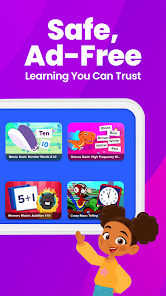The process of learning and teaching has been majorly transformed in the last decade. Driven by the innovations of mobile apps, learning has exploded digitally across the globe, with thousands of online learning apps downloaded to date. The invention of an online learning platform is not only shaping the learning habits of children worldwide but also revolutionising the entire educational field.

What Is A Learning App?
Learning applications are software explicitly curated for education, focusing on boosting knowledge, acquisition, and learning experience. These apps are usually available on multiple platforms, such as tablets, smartphones, and computers, making the process of learning more accessible and engaging for learners of different ages.
Online learning apps have gained extensive popularity because of their ability to add a fun element to learning and preschool activities in different ways. These apps make learning fun with the use of storytelling, games, quizzes, and other fun activities.
How Do Educational Apps Make Learning Fun?
Online learning applications are designed specifically for education, along with a wide range of features enhancing the learning experience of kids. Some features through which educational apps make learning fun are as follows:
- Gamification elements
The developers of learning apps leverage gamification elements to make learning more motivating, rewarding, and fun for the kids by including elements, such as badges, points, leaderboards, levels, challenges and rewards. Gamification increases the users’ retention, engagement, and loyalty by curating a sense of competition, achievement, and social recognition.
- Collaboration and social learning
Collaboration and social learning are the significant features enabling users to communicate, interact, and cooperate with other users, such as mentors, teachers, experts, or peers. Collaboration and social learning focus on making learning more collaborative, social and diverse for the kids by offering them exposure to multiple opinions, perspectives and experiences. Additionally, collaboration and social experience increase the users’ participation, engagement, and learning outcomes by curating a sense of belonging, community and support.
- Storytelling
Storytelling has always been a great way to teach kids about different morals and values. An online learning app focuses on teaching kids different subjects such as alphabet learning, English, Hindi, moral science and environmental education through engaging storylines with attractive, animated characters. As kids get more engaged towards real-life-like characters explaining about a particular method or value rather than books, digital learning becomes more fun for them.
- Adaptive learning technology
Adaptive learning technology uses data analytics, artificial intelligence, and other algorithms to customise the learning process, content and experience for every user on the basis of their preferences, needs and goals. Hence, adaptive learning makes the learning process more efficient, intelligent, practical and engaging for the users by offering optimal content, pace, and difficulty for every user according to their changing preferences, goals, and needs.
Conclusion:
Investing your kids’ time towards an educational app comes with the potential to help in their overall growth, along with teaching them critical skills and subjects. Educational apps for kids make education more accessible, interactive, and engaging for the kids by leveraging technologies and approaches such as adaptive learning, gamification and storytelling.